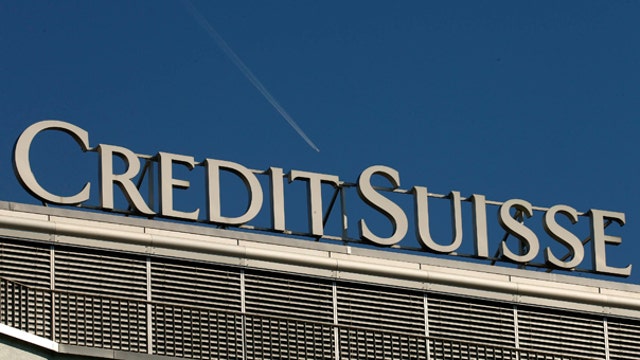NY AG Preps Case Against Credit Suisse Dark Pool
The New York Attorney General’s office is taking aim at its next target in its year-long inquiry into high-frequency trading abuses through lightly regulated stock markets known as “dark pools.”
The FOX Business Network has learned that New York Attorney General Eric Schneiderman’s office is preparing a civil case against Credit Suisse AG (NYSE:CS), the operator of the Crossfinder dark pool, that could be announced in the coming weeks. The case would mark the second major civil action filed by the AG’s office since regulators launched their probe into deceptive practices in these markets last year. The CEO of Credit Suisse, Tidjane Thiam is a member of the 21st Century Fox (NYSE:FOXA) Board of Directors, the parent of the FOX Business Network and FOXBusiness.com.
By some measurements, Crossfinder is considered Wall Street’s largest dark pool, trading more so-called Tier 1 stocks (those that appear in major indexes like the Standard & Poor’s 500) than any other private exchange. The exact nature of the attorney general’s case against Credit Suisse is unclear; but according to one person with knowledge of the matter, it would be similar to the civil action Schneiderman’s office took against the dark pool operated by Barclays (NYSE:BCS) that involved what’s known as “latency arbitrage.”
Because high-frequency traders have a speed and information advantage over other traders in a dark pool, they can take advantage of the slowness or latency of these other participants and thus have an unfair advantage in buying and selling stocks. At issue for Schneiderman’s office: Do dark pools like the ones operated by Barclays and possibly Credit Suisse provide the high-frequency traders this unfair advantage in order to attract their order flow of trades to its trading venue? Since the high-frequency orders are often undisclosed, such a move enhances the dark pool’s profitability because it would drive other players to trade through the venue because of its increased liquidity.
A spokesman for the attorney general’s office declined to comment on the matter. A spokeswoman for Credit Suisse also declined comment but wouldn’t deny that the firm is a target in a dark pool probe with the AG’s office that is in its end stages. It’s unclear if Schneiderman’s office and Credit Suisse will reach a settlement in the matter, or whether regulators will file charges without one, as they did against Barclays for similar alleged abuses in its dark pool.
In June of last year, Schneiderman filed a civil fraud case against Barclays alleging that the bank concealed the level of high-frequency trading in its dark pool to other investors, and allowed high-frequency traders to benefit from a situation where other traders relied on information provided at a much slower speed. Because high-frequency traders process orders at super-fast speeds, they can front run orders by other participants, and earn huge trading profits.
Barclays has denied the charges and has asked a New York state Supreme Court judge to dismiss the case. In February, Judge Shirley Werner Kornreich denied the bank’s motion for dismissal but also alerted Schneiderman’s office to provide more definitive proof that Barclays misled other investors about the nature of the high-frequency trading in its dark pool. Credit Suisse and Barclays are among several operators of dark pools that have come under scrutiny over the past year. Other firms under include UBS (NYSE:UBS), Morgan Stanley (NYSE:MS) and Goldman Sachs (NYSE:GS).
Dark pools are what’s known as alternative trading systems, or privately-operated exchanges where investors can buy and sell stocks without the transparency that occurs when trades are funneled through established exchanges such as the New York Stock Exchange, which is owned by Intercontinental Exchange (NYSE:ICE), or the Nasdaq OMX (NASDAQ:OMX). They became popular among investors such as mutual funds in recent years because trades can be hidden from other market participants who might otherwise seek an edge in pricing. But they are also controversial: Market participants say the pools are so lightly regulated, they are used to conduct trades that put other investors at a disadvantage when they deal with some high-frequency trading shops that can sell or buy stocks in a fraction of a second.
The New York attorney general’s office has launched the most wide-ranging investigation into dark pools. In June of 2014, Schneiderman told FOX Business that his office’s focus is on potential legal violations on the part of large banks that profit from high-frequency traders. He added that “the thought has occurred to us” to look at other banks based on evidence including those from whistle blowers and said his inquiry will “change the dark pool business."
The New York attorney general’s office is among the most powerful white-collar law enforcement units in the country based on a New York state law known as the “Martin Act,” which gives prosecutors broad powers to bring fraud charges against alleged targets.
The Securities and Exchange Commission is also examining dark pools and potential abuses by high-frequency trading firms following the 2014 publication of the book “Flash Boys” by financial journalist Michael Lewis, who alleged that the nation’s stock markets were being rigged by high-speed trading.
Despite Lewis’s critique, no major high-frequency trading firm has been charged in the government’s various probes. In fact, Schneiderman’s office has so far steered clear of charging trading shops, but rather focused on operators of dark pools that allegedly fail to disclose unfair advantages given to high-speed traders.




















